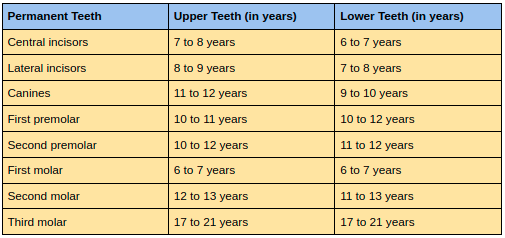Introduction
Teething or eruption of the first milk teeth is a milestone in a child’s development. Eruption disturbances include delayed eruption, incomplete eruption, eruption does not occur at all, or the normal direction of eruption is influenced. To recognize the eruption disturbances on time, a thorough knowledge of the normal development of dentition is essential. Problems related to eruption disturbances are common in the permanent dentition but rare in deciduous dentition. An early diagnosis can prevent many undesirable dental conditions, or the seriousness can be limited.
When Do Teeth Usually Appear?
Human dentition consists of 20 deciduous or primary teeth and 32 permanent teeth. Primary or milk teeth are the first teeth to erupt in the oral cavity. Tooth development begins in the fetus at about 28 days in utero. All the primary and some parts of the permanent dentition develop in the fetus. Mineralization of the primary dentition starts at about 14 weeks in utero. All the primary teeth are mineralized at birth. The permanent incisors and first molars begin to mineralize at or close to birth, whereas the other permanent teeth start to mineralize later. Tooth eruption occurs after the formation and mineralization of the crown but before the roots are fully formed.
Teething is when the baby's first teeth erupt in the oral cavity. It may be preceded by a transient bluish gingival swelling that may rupture spontaneously. It is mainly associated with irritability, disturbed sleep, drooling, fever, or a circumoral rash.
The average ages of tooth eruption are:


What Is the Etiology of Delayed Tooth Eruption?
A delay in tooth eruption upto 12 months may be of little or no importance in a healthy child. Delay is mainly due to local factors such as the path of eruption, insufficient space in the dental arch, or infection in the tooth. Impaction (failure to erupt through the gums) is commonly seen in third molars, second premolars, and canines because they are the last tooth to erupt in the oral cavity. Generalized failure of tooth eruption is rare, but it may be associated with various systemic causes.
Causes of delayed tooth eruption in primary teeth include:
-
Impacted teeth.
-
Excessively thick gums.
-
Supernumerary or extra teeth.
-
Injury or trauma where the tooth needs to erupt.
-
Odontogenic tumors (tumor or cancer arising from the tooth buds).
-
Oral clefts (congenital disability affecting the oral cavity or mouth).
-
Ectopic eruption (eruption of the teeth other than the usual site).
-
Ankylosis (fusion of the alveolar bone and cementum of the teeth).
-
Iatrogenic causes.
-
Cytotoxic therapy (cancer treatment).
-
Radiotherapy (use of high doses of radiation to kill cancer cells).
-
Down syndrome (a genetic disorder in which there is an abnormal cell division resulting in an extra gene).
-
Cleidocranial dysplasia (a genetic disorder affecting teeth and bones). Dental anomalies are found in more than 90% of such individuals.
-
Apert syndrome (a genetic disorder characterized by skeletal abnormalities).
-
Congenital hypopituitarism (deficiency of one or more hormones produced by the anterior pituitary).
-
Congenital hypothyroidism (thyroid glands fail to develop or function properly).
-
Gaucher disease (buildup of fatty substances in specific organs).
-
Osteopetrosis (a bone turnover defect that causes easy bone breaking).
-
Family history and other genetic disturbances.
-
Low birth weight or premature birth.
-
Vitamin D or nutritional deficiency.
-
Conditions like HIV, anemia, kidney diseases, cancer, heavy metal poisoning affect the child's immune system and cause a delay in tooth eruption.
-
Long-term medications like Phenytoin can affect normal tooth development.
Delayed eruption in the permanent tooth is due to early loss of milk teeth, retained milk teeth, or harmful habits that obstruct the path of the erupting teeth, like constantly touching the teeth with their hands.
What Are the Complications of Delayed Tooth Eruption?
The complications of delayed tooth eruption include-
-
Need for orthodontic treatment due to tooth discrepancies like crowding or poorly aligned teeth. Tooth eruption is related to the growth of the jaws and face. A delayed discharge may cause abnormal development of them.
-
A delayed eruption can alter the position of the neighboring teeth.
-
Undiagnosed genetic disorders.
-
Undiagnosed nutritional deficiencies can further delay growth and development.
-
Possible delayed development in other areas of the body.
What Are the Treatment Options Available?
If the delay in tooth eruption is due to the family pattern, treatment is not required. However, if other underlying medical conditions and local factors cause the delay, then treatment is done. Extraction is done to remove the milk tooth, which is not exfoliated. Surgery to remove thick gums and help the tooth erupt or unite oral clefts is done. Orthodontic treatment to pull the tooth out over a period of time is done. Underlying systemic medical conditions must be treated accordingly.
Conclusion
If you suspect a delayed eruption, then a proper evaluation by a dentist is necessary to find out the underlying cause and treatment if required. The primary or permanent teeth play an important role in the child's chewing function and phonetics. Dental anomalies can either be seen as individual findings or craniofacial abnormalities and in both cases, they affect the individual's quality of life.












